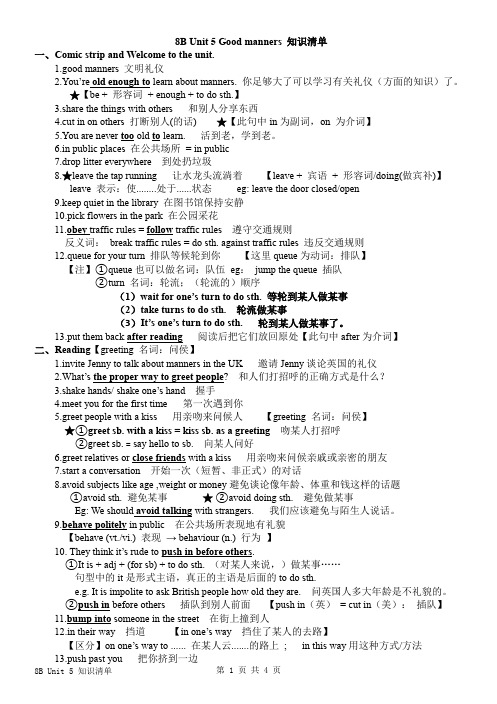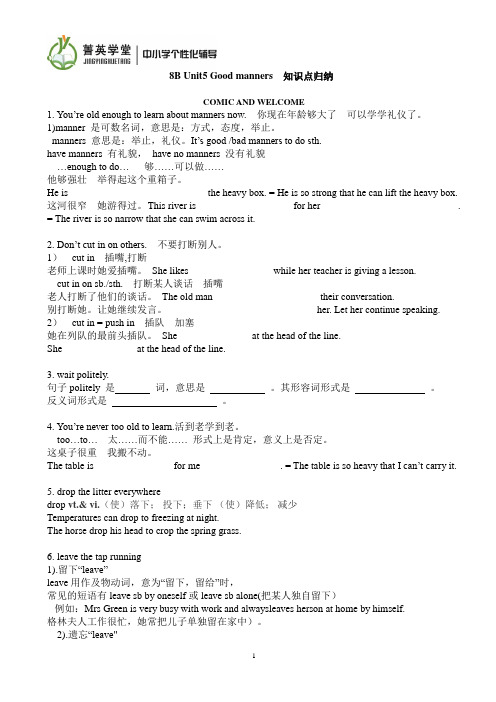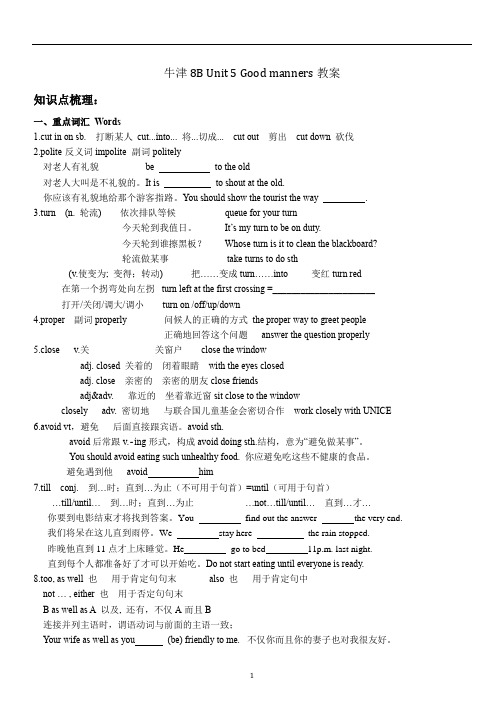2017年牛津译林版初中英语8B Unit5 Good manners知识归纳与拓展
8B Unit 5 Good manners知识清单

8B Unit 5 Good manners 知识清单一、Comic strip and Welcome to the unit.1.good manners 文明礼仪2.You’re old enough to learn about manners. 你足够大了可以学习有关礼仪(方面的知识)了。
★【be + 形容词+ enough + to do sth.】3.share the things with others 和别人分享东西4.cut in on others 打断别人(的话) ★【此句中in为副词,on 为介词】5.You are never too old to learn. 活到老,学到老。
6.in public places 在公共场所= in public7.drop litter everywhere 到处扔垃圾8.★leave the tap running 让水龙头流淌着【leave + 宾语+ 形容词/doing(做宾补)】leave 表示:使........处于......状态eg: leave the door closed/open9.keep quiet in the library 在图书馆保持安静10.pick flowers in the park 在公园采花11.obey traffic rules = follow traffic rules 遵守交通规则反义词:break traffic rules = do sth. against traffic rules 违反交通规则12.queue for your turn 排队等候轮到你【这里queue为动词:排队】【注】①queue也可以做名词:队伍eg:jump the queue 插队②turn 名词:轮流;(轮流的)顺序(1)w ait for one’s turn to do sth. 等轮到某人做某事(2)take turns to do sth. 轮流做某事(3)It’s one’s turn to do sth.轮到某人做某事了。
8B_Unit5_Good_manners知识点详解加练习讲解

8B Unit5 Good manners 知识点归纳COMIC AND WELCOME1. You’re old enough to learn about manners now. 你现在年龄够大了 可以学学礼仪了。
1)manner 是可数名词,意思是:方式,态度,举止。
manners 意思是:举止,礼仪。
It’s good /bad manners to do sth.have manners 有礼貌,have no manners 没有礼貌…enough to do… 够……可以做……他够强壮 举得起这个重箱子。
He is ______ _______ ______ _______the heavy box. = He is so strong that he can lift the heavy box. 这河很窄 她游得过。
This river is ________ __________ for her _______ _________ __________. = The river is so narrow that she can swim across it.2. Don’t cut in on others. 不要打断别人。
1) cut in 插嘴,打断老师上课时她爱插嘴。
She likes __________ ______while her teacher is giving a lesson.cut in on sb./sth. 打断某人谈话 插嘴老人打断了他们的谈话。
The old man ______ _______ _______their conversation.别打断她。
让她继续发言。
_______ _______ ______ _______ her. Let her continue speaking.2) cut in = push in 插队 加塞她在列队的最前头插队。
译林版牛津英语8B全册八单元知识点整理及单元测试卷:8 B Unit 5 Good manners

Unit 5 Good manners内容全解Part One Comic strip重点全解1、You’re old enough to learn about manners now, Hobo. (P 64)(1)manner 可数名词,此处意为“礼貌,礼仪,礼节”,常用复数形式。
常用搭配:good manners 有礼貌bad manners 没礼貌table manners 餐桌礼仪(2) manner 作可数名词,还有“方法,方式”之意,常用单数形式,与way同义。
例如:You should write in this manner.2、First, always share your things with others.(P 64)share sth with sb 意为“和某人分享、合用某物”。
例如:Let’s share the birthday cake with them.3、Second, don’t cut in on others. (P 64)cut in (on sb.) 意为“打断某人的谈话,插嘴”,相当于interrupt sb。
例如:Mary likes to cut in on others.4、Always wait politely. (P 64)(1) politely 副词,意为“礼貌地”,常用来修饰动词。
例如:We should speak to the old politely.(2) polite 形容词,意为“礼貌的”,可用作定语、表语等,它的反义词impolite,意为“无礼的”。
be polite to sb. 意为“对某人有礼貌”。
例如:It’s impolite to shout loudly.The students are polite to their teachers.Part Two Welcome to the unit重点全解1、Leave the tap running.(P 65)(1) leave sth doing意为“使/让.......处于.....状态”。
Unit5Goodmanners_task知识点讲义-牛津译林版英语八年级下册

【Task~Selfassessment】重点单词1.purpose n.目的purposeful adj.有目的的;坚毅的purposefully adv.果断地,有明确目的地purposely adv.故意地,蓄意地2.* content n.内容;目录3.* conclusion n.总结,归纳4.guest n.客人,宾客5. * host n.主人;主持6.impolite adj.不礼貌的反义词polite adj.礼貌的impolitely adv.无礼地;没规矩地impoliteness n.无礼,失礼politely adv.礼貌地(比较级)more politely (最高级)most politely polite adj.礼貌的(反义词)impolite◆adj.不礼貌的【Task~Selfassessment】重点短语1.give a talk on sth. 做一个关于……的报告2.good table manners 良好的餐桌礼仪3.the purpose of the talk 演讲的目的4.the purpose of... .....的目的5.start doing sth. 开始做某事6.make too much noise 制造太多噪音;发出太多的噪音7. make too much noise while eating or drinking 吃喝时弄出太多声音8.eat with your mouth open 张着你的嘴巴吃9.don't talk with food in your mouth 嘴里有食物时别讲话10.talk with food in one's mouth 嘴里含着食物说话11.reach over sb. 's plate for sth. 越过某人的盘子取东西12.wait for everyone to finish 等待每个人结束13.make sure 确信,确保14.both guests and hosts... 宾客和主人都.....15.remember to do sth. 记得要去做某事16.hold a talk on good table manners 举办一个有关良好餐桌礼仪的讲座17.teach students rules for eating 教学生们吃饭的规矩18.take place 发生;举行19.a lot of rules on... 许多关于......的规则20. a lot of advice on table manners 很多关于餐桌礼仪的建议21.above all 首要的是;首先22.sit at the table 坐在桌子旁23. a lot of advice on table manners 很多关于餐桌礼仪的建议【Task~Selfassessment】重点句型1. Do not eat with your mouth open. 吃饭的时候不要张着嘴。
8B Unit5知识点总结

牛津8B Unit 5 Good manners教案知识点梳理:一、重点词汇Words1.cut in on sb. 打断某人cut...into... 将...切成... cut out 剪出cut down 砍伐2.polite-反义词impolite -副词politely对老人有礼貌be to the old对老人大叫是不礼貌的。
It is to shout at the old.你应该有礼貌地给那个游客指路。
You should show the tourist the way .3.turn (n. 轮流) 依次排队等候queue for your turn今天轮到我值日。
It’s my turn to be on duty.今天轮到谁擦黑板?Whose turn is it to clean the blackboard?轮流做某事take turns to do sth(v.使变为; 变得;转动) 把……变成turn……into 变红turn red在第一个拐弯处向左拐turn left at the first crossing =______________________打开/关闭/调大/调小turn on /off/up/down4.proper---副词properly 问候人的正确的方式the proper way to greet people正确地回答这个问题answer the question properly5.close v.关关窗户close the windowadj. closed 关着的闭着眼睛with the eyes closedadj. close 亲密的亲密的朋友close friendsadj&adv. 靠近的坐着靠近窗sit close to the windowclosely adv. 密切地与联合国儿童基金会密切合作work closely with UNICE 6.avoid vt,避免后面直接跟宾语。
牛津译林英语8B Unit5 Good manners 知识点

牛津译林英语8B Unit5 Good manners一、重要词汇和短语1. politely adv.礼貌地eg. We should speak to the old people politely. 我们应该跟老年人礼貌交谈。
polite ---- impolite 不礼貌的eg. It is impolite to laugh at others. 嘲笑别人是不礼貌的。
2. litter n.垃圾(不可数)近义词n. rubbish (不可数)eg. Don’t throw litter/rubbish everywhere.不要到处乱扔垃圾。
There is a public sign saying “No Littering”.这儿有句公共标语—禁止乱扔垃圾。
3. run v.流动;跑;(车辆、机器)开动,运转run--- ran --- runeg. Don’t leave the tap running . 不要让水一直都流淌着。
(现在分词做宾语补足语,表示主动和正在进行)The machine ran very well. 机器运转非常正常。
4. pick v. 采摘,挑选,拾取pick flowers in the park①pick out 1. 挑选出;拣出Eg. Let me pick out some good apples for you.2. 辨认出Eg. It's easy to pick him out in a crowd because he is very tall.②pick up 1. 拾起Eg. The boy picked up the hat for the old man.2. 收拾Eg. You should pick up the tools after work.3. 学到;获得Eg. He was picking up the skills quickly.4. 与...偶然结识(常指与异性调情)Eg. We picked up a couple of girls at the pub last Friday.5. 搭便车③pick off 摘掉;取走Eg. You should not pick off any of the flowers.④pick at 1. 吃得很少Eg. The boy is only picking at his food.2.找...的岔;挑毛病Eg. Why are you always picking at me?5. turn n. 轮流①It is one’s turn to do sth. 轮到某人做某事②take turns to do sth.= do sth. in turn = do sth by turns轮流做某事in turn 依次,相继地by turns 轮流地,交替地eg. It is your turn to make a decision.They took to do the housework.= They did the housework turn / turns.③course 一段时间内学完的完整课程eg. This term I’m taking five courses.13.public n. 群体in public 在公众场合adj. 公共的,公开的public signs 公共标识eg. The museum is open to the public every day.Don’t speak loudly in public.Do people there behave politely in public ?14. push v. 推,挤push past sb.从某人身边挤过去[拓展] ①push on 继续前进②push in 插队cut in 插嘴Eg. Don't cut in on your mother when she is speaking.当你的妈妈在说话时,不要去插嘴。
牛津译林版英语8B-Unit5-Good-manners-知识归纳与拓展
8B Unit 5Good manners知识归纳与拓展【单词拓展】1. politely adv. 礼貌地→polite adj. 有礼貌的→impolite adj. 不礼貌的2. proper adj. 正确的→properly adv. 正确地3. close adj. 亲密的;严密的→close adv. 近地→closely adv. 密切地;仔细地→closed ad j. 关闭的→close vt.&vi. 关4. discussion n. 讨论→discuss vt. 讨论5. loudly adv. 大声地→loud ad j. 大声的6. Roman n. 罗马人→Rome n. 罗马7. say vt. 说→saying n. 谚语,格言8. warn vt.&vi. 警告,告诫→warning n. 警告9. public n. 群体,民众→public adj. 公共的;公开的10. parking n. 停车→park vt. 停11. kiss n.亲吻→kiss vt. 吻,亲12. litter n. 垃圾→litter vt.&vi. 乱丢杂物13. practice n. 练习;训练;实践→practise/practice vt.&vi. 练习,训练14. host n. 主人;主持→host vt. 主持【短语归纳】1. cut in (on sb. /sth.) 打断(谈话),插嘴2. drop litter everywhere 到处乱扔垃圾3. leave the tap running 让水龙头一直开着4. obey traffic rules遵守交通规则5. queue for one's turn排队等候6. put them back把它们放回去7. shake one's hand和某人握手8. greet people with a kiss用亲吻的方式跟人打招呼9. behave politely in public在公共场合举止有礼貌10. bump into someone撞到某人11. in their way挡了他们的路12. push past someone从某人身旁挤过去13. all the time一直,总是14. be helpful to us对我们有帮助15. by accident偶然,意外地16. avoid talking about age避免谈论年龄17. keep us safe from danger保护我们免除危险18. make his dream come true实现他的梦想19. hold a talk on good table manners举办一个关于良好的餐桌礼仪的讲座20. above all首先,首要的是21. keep one’s voice down压低声音22. warn sb. not to do sth.警告某人不要做某事23. express oneself clearly清楚表达自己的意见【句型分析】1. I hope so. ( P67 )原句意为:我希望如此。
牛津译林版八年级英语下册Unit5Goodmanners知识点总结
Unit 5 Good manners词性转换1. manner (复数)2. run (动名词)3. proper (副词)4. kiss (复数)5. close (副词)6. behave (名词)7. loud (副词)8. Rome (形容词)9. discuss (名词)10. express (名词) 11. explain (名词) 12. park (动名词)13. successful (副词) 14. successful (名词) 15. conclusion (动词)二、重点短语1. 与某人分享某物2. 打断谈话3. 到处乱扔垃圾4. 把水龙头一直开着5. 摘花6. 遵守交通规则7. 排队等候 8. 在公共场合9. 保持安静 10. 保持图书馆干净11. 在书上写字 12. 邀请某人做某事13. 与某人握手 14. 以一个吻向某人问候15. 开始谈话 16. 举止礼貌17. 避免做某事 18. 插队19. 碰撞到某人 20. 挡住某人的路21. 打扰了 22. 也,还有23. 偶然地 24. 一直,经常25. 压低声音 26. 让我想想27. 俗话说的好 28. 参与讨论29. 清楚表达自己的意见 30. 要点31. 注意小变化 32. 向某人解释某事33. 给我们有用的信息 34. 保护,使免受35. 警告某人不要做某事 36. 不久之后37. 禁止吸烟 38. 禁止停车39. 禁止乱扔垃圾 40. 禁止照相41. 给某人照相 42. 公共标志43. 冒险做某事 44. 刚才45. 坚持练习说英语 46. 讲座的目的47.举行一个关于良好餐桌礼仪的讲座48. 许多建议 49. 在学校礼堂50. 首先 51. 等待某人做某事52. 确保 53. 制造太多噪音三、单项选择题( ) 1. Zhao Hua is brave enough his neighbour from the fire.A. savedB. saveC. to saveD. saving( ) 2. --- I hope you can help me clean the classroom after school.--- .Sorry, I’m afraid not B. Yes, I’m busy C. It doesn’t matter D. Certainly not ( ) 3. --- Can we run across the road now?--- No, we . We have to wait until the light turns green.needn’t B. mustn’t C. couldn’t D. shouldn’t( )4. I couldn’t walk fast because a lot of people were .A. in my wayB. on my wayC. in some waysD. by the way( ) 5. --- What else do you need?--- else. I think I have got everything ready.A. SomethingB. NothingC. EverythingD. Anything( ) 6. Please remember the following thing when you are in the museum. , don’t touch the things. Second, don’t make much noise……A. First of allB. By the wayC. In factD. So far( ) 7. She is not strong enough walking up mountains.A.to goB. goingC. goD. went( ) 8. Simon is to make us all .A .enough funny; laugh B. funny enough; laughC. enough funny; to laughD. funny enough; to laugh( ) 9. Most of the public signs give us .A .a useful information B. useful informationC. useful informationsD. an useful information( ) 10. The proper way people in China is hands with each other.to greet; to shake B. greeting; shakingC. to greet; shakingD. greeting; to shake四、词汇A.根据首字母、汉语提示写单词。
8B Unit5 Good manners知识点汇总
8B Unit5 Good manners单元知识点汇总Comic strip&Welcome to the unit1.Second, don't cut in on others. (P64)第二,不要打断其他人。
cut in (on sb./sth.)打断(谈话),插嘴,cut down砍倒;减少,削减cut off切断,割断,剪断cut out切去,切除;剪下2.Always wait politely.(P64)总是礼貌地等候。
polite adj.有礼貌的impolite adj.没有礼貌的politely adv.没有礼貌地be polite to sb.对…有礼貌be rude to sb.对…粗鲁3.leave the tap running (P65)水龙头一直在流leave vt.(1)使…处于某种状态,the tap做宾语,现在分词running是宾语补足语。
“leave sth. +宾语补足语”结构中,可用形容词、副词、现在分词或过去分词等作宾语补足语。
①现在分词作宾语补足语,如.What he said left me thinking deeply.①形容词作宾语补足语,如.His illness left him weak.(2)离开;脱离leave…for…离开…前往…如.I'll leave Nanjing for Beijing tomorrow.(3)遗忘;丢下leave sth.+地点如.I left the book at home.forget sth.表示忘记某物,不强调地点,但在“leave sth.+地点”结构中强调地点。
①过去分词作宾语补足语,如.The moving story left him unmoved.①副词作宾语补足语,如.What has left him away for so long?①介词作宾语补足语,如.This matter left her without a way of hope.4.queue for your turn(P65)排队等待(1) queue v.意为“排队等候”如.We should queue up at the ticket office.(2)turn n.顺序,轮流It's one's turn to do sth.轮到某人做某事,take one's turn to do sth.=do sth.in turn=do sth.by turns轮流做某事,vt.旋转turn down关小turn up开大/出现turn on打开turn off关(水源、煤气、电灯等)turn in上交linking-V.变得turn green/yellow变绿/黄了5.I'm afraid not.(P65)我恐怕不是。
译林版牛津英语8B Unit 5 单词知识点讲义
8B Unit 5 单词知识点讲义1.manners n.(复)礼貌,礼仪;规矩good/bad manners 有/没有礼貌have manners 有礼貌have no manners 没礼貌It’s good manners to keep quiet in the library.在图书馆保持安静是有礼貌的。
show good manners to sb 对某人有礼貌2.cut in (on sb/sth)打断,插嘴Don’t cut in on others. 不要打断别人。
cut in 插队3. im polite adj. 不礼貌的impolite ly polite有礼貌的---politely adv.有礼貌地be polite / impolite to…..It’s impolite to shout at others.对别人大叫是不礼貌的。
We should speak to the old politely.我们应该有礼貌地对老人说话。
4. litter n. 垃圾,杂物rubbishdrop litter everywhere 到处扔垃圾drop litter carelessly 随意扔垃圾a lot of litter 许多垃圾5. tap n.水龙头;旋塞turn on/off the tap 打开/关水龙头6. run v.流动leave the tap running 让水龙头的水流淌7. pick vt.采,摘pick apples/cotton 摘苹果/棉花pick vt. 挑选pick another citypick up捡起;pick out挑选出8. obey vt. & vi. 遵守,顺从obey traffic rules 遵守交通规则obey orders 服从命令9. queue vi. 排队等候queue at the school gate 在校门口排队等候queue up for a bus 排队等汽车queue n.行列,长队wait/stand in a queue排队等候10. turn n. 轮流,顺序queue for your turn 排队等轮到你wait your turn等轮到你take turns to do sth 轮流做某事It’s one’s turn to do sth轮到----做It’s my turn to clean the blackboard.轮到我擦黑板。
- 1、下载文档前请自行甄别文档内容的完整性,平台不提供额外的编辑、内容补充、找答案等附加服务。
- 2、"仅部分预览"的文档,不可在线预览部分如存在完整性等问题,可反馈申请退款(可完整预览的文档不适用该条件!)。
- 3、如文档侵犯您的权益,请联系客服反馈,我们会尽快为您处理(人工客服工作时间:9:00-18:30)。
2017年牛津译林版初中英语8B Unit 5Good manners知识归纳与拓展【单词拓展】1. politely adv. 礼貌地→polite adj. 有礼貌的→impolite adj. 不礼貌的2. proper adj. 正确的→properly adv. 正确地3. close adj. 亲密的;严密的→close adv. 近地→closely adv. 密切地;仔细地→closed ad j. 关闭的→close vt.&vi. 关4. discussion n. 讨论→discuss vt. 讨论5. loudly adv. 大声地→loud ad j. 大声的6. Roman n. 罗马人→Rome n. 罗马7. say vt. 说→saying n. 谚语,格言8. warn vt.&vi. 警告,告诫→warning n. 警告9. public n. 群体,民众→public adj. 公共的;公开的10. parking n. 停车→park vt. 停11. kiss n.亲吻→kiss vt. 吻,亲12. litter n. 垃圾→litter vt.&vi. 乱丢杂物13. practice n. 练习;训练;实践→practise/practice vt.&vi. 练习,训练14. host n. 主人;主持→host vt. 主持【短语归纳】1. cut in (on sb. /sth.) 打断(谈话),插嘴2. drop litter everywhere 到处乱扔垃圾3. leave the tap running 让水龙头一直开着4. obey traffic rules遵守交通规则5. queue for one's turn排队等候6. put them back把它们放回去7. shake one's hand和某人握手8. greet people with a kiss用亲吻的方式跟人打招呼9. behave politely in public在公共场合举止有礼貌10. bump into someone撞到某人11. in their way挡了他们的路12. push past someone从某人身旁挤过去13. all the time一直,总是14. be helpful to us对我们有帮助15. by accident偶然,意外地16. avoid talking about age避免谈论年龄17. keep us safe from danger保护我们免除危险18. make his dream come true实现他的梦想19. hold a talk on good table manners举办一个关于良好的餐桌礼仪的讲座20. above all首先,首要的是21. keep one’s voice down压低声音22. warn sb. not to do sth.警告某人不要做某事23. express oneself clearly清楚表达自己的意见【句型分析】1. I hope so. ( P67 )原句意为:我希望如此。
在英语中,某些表示想法的动词或结构后,可以接替代词so(用于肯定)和not(用于否定),用以代替前面提到的内容。
这类动词和结构主要有:think,believe,hope,suppose,guess,imagine,expect,be afraid等。
如:(1) 一Will he come to the party?他来参加晚会吗?一I hope so.我希望他来。
一I hope not.我希望他不来。
一I don't hope so.(误)(2) 一Can you finish it in time?你能及时完成吗?一I'm afraid so.恐怕可以吧。
一I'm afraid not.恐怕不行。
(3)一Is that Mary?那是玛丽吗?一Yes. I think so.我想是的吧。
I don’t think so.我想不是吧。
(4)一Will he be late again?他会又迟到吗?一I believe so.我相信会是如此。
I believe not.我相信不会吧。
2 . W by not? ( P73 )原句意为:为什么不要?why not意为“为什么不”,其后跟动词原形,这个句型还可以变成:Why don't you do sth.?表示“劝说、建议某人去做某事”。
如:Your spoken English is poor. Why not join an English club?你的英语口语很差。
为什么不参加一个英语俱乐部呢?Why not come early?=Why don't you come early?你为什么不早点来?常见的征求建议的句型还有:What/How about+名/词代词/v. -ing?……怎么样?如:What/How about going for a walk?去散步好吗?Shall we do...?我们做……好吗?如:Shall we play football?我们去踢足球好吗?Let's do…让我们做……吧。
如:Let's have a rest.让我们休息一会儿吧。
Would you like ( to do)...?你想(做)……吗?如:Would you like some bread?你想要些面包吗?3. These rules are important because we should make sure that both guests and hosts are comfortable at the table. (P77)原句意为:这些规则很重要,因为我们应该确保坐在桌子边的客人和主人都轻松自在。
句中的make sure意为“弄清楚;务必;确信”,其后多接that引导的宾语从句,有时也与of/about连用。
如:I make sure that I have turned the tap off.我确信我已关上了水龙头。
Please make sure of the time and place.请弄清楚时间和地点。
be sure of/that...意为“对……有把握;确信”,主语常是人。
如:He is sure of succes.=He is sure that he will succeed.他确信他会成功。
be sure to do sth.意为“一定,必然会”,主语可以是人,也可以是物,表示说话人的推测。
如:He's sure to win.他一定会赢。
It is sure to rain.天准会下雨。
另外,注意at table与at the table的区别。
at table意为“在吃饭”,其结构为:at+名词,表示状态。
如:Don't speak loudly when you are at table.在吃饭时,不要大声说话。
They were at table when we dropped in.我们去拜访时他们正在吃饭。
at the/a table意为“在桌子旁”,不一定在吃饭。
如:They were sitting at the table, talking about something they were interested in.他们正坐在桌边谈论他们感兴趣的事情。
【语法点拨】enough to的用法“be+adj./adv.+enough to do sth.”结构常用来描述一个人的个性、品格和能力。
该结构可以用so... that句型进行替换。
如:He is strong enough to carry the heavy stone.=He is so strong that he can carry the heavy stone.他够强壮能搬起这块很重的石头。
enough在句中可以作状语、定语和表语。
如:The house is not big enough for us.这房子对我们来说不够大。
(作状语)Have you got enough money?你的钱够吗?(作定语)Six bottles should be enough.六瓶应该够了。
(作表语)too... to的用法英语中too... to结构的基本形式是“be too+adj./adv.(for sb.)+to do sth.”,意为“(对某人来说)太……而不能……”,它在形式上是肯定的,但在意义上是否定的。
使用该结构时,应注意以下几点:1. 当主语本身是动词不定式的逻辑宾语时,不定式后不接宾语。
此时的不定式如果是不及物动词,动词之后应加上适当的介词,这时的主语就变成了介词的宾语。
如:The water in the glass is too hot to drink.杯子内的水太热了不能喝。
( drink是及物动词,the water是drink的逻辑宾语)The house is too old to live in.这房子太旧了不能住( live是不及物动词,其后须接介词,the house是in的逻辑宾语) 2.当主语不是不定式的逻辑宾语,而不定式是及物动词时,动词之后要接宾语。
如:The hall is too small to hold so many students.会堂太小了不能容纳这么多学生。
3. 动词不定式之前可以带逻辑主语,表示不定式动作的执行者,常用for sb.。
如:The house is too expensive for him to buy.对他来说这房子太贵了,买不起。
4. 如果在too之前加上not或never,该结构就不再有否定的意义,意为“永/绝不……做某事”。
如:Chinese is not too difficult to learn.汉语绝不难学。
One is never too old to learn.活到老,学到老。
